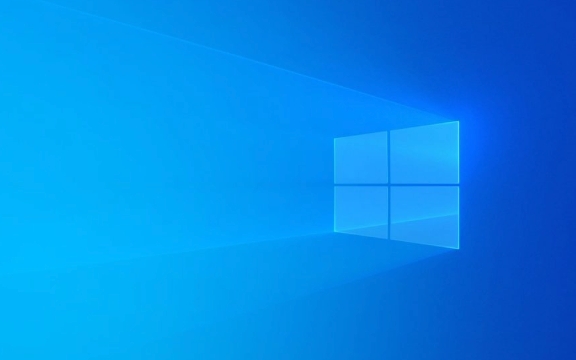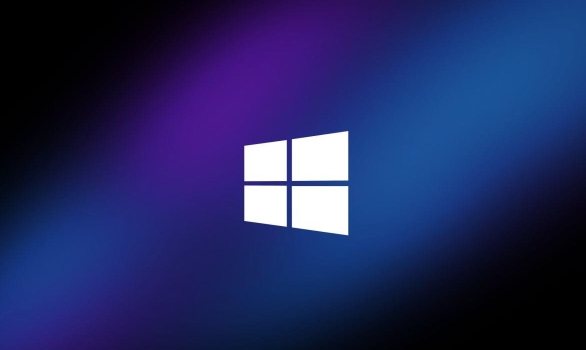 Computer Tutorials
Computer Tutorials
 Troubleshooting
Troubleshooting
 my win pc monitor keeps going black for a few seconds randomly
my win pc monitor keeps going black for a few seconds randomly
my win pc monitor keeps going black for a few seconds randomly
Jul 30, 2025 am 03:41 AMCheck cables and connections for looseness or damage, reseat both ends, try a different cable, and avoid adapters. 2. Update or roll back graphics drivers through Device Manager or use DDU in Safe Mode for a clean reinstall. 3. Adjust power settings by turning off PCI Express Link State Power Management and disabling sleep or eco modes on the monitor. 4. Test for hardware issues by connecting to a different monitor or using another device with your monitor to isolate the problem. 5. Correct refresh rate or resolution mismatches by setting the monitor to its native resolution and lowering the refresh rate temporarily. 6. Rule out software conflicts by booting into Safe Mode, performing a clean boot, and disabling startup apps or overlays. The issue is usually fixable without hardware replacement and often stems from cables, drivers, or settings.

If your Windows PC monitor keeps going black for a few seconds randomly, it’s usually not a major hardware failure—though it could be. More often, it’s something fixable related to drivers, cables, power settings, or display signals. Here are the most common causes and what you can do about them.

1. Check Your Cables and Connections
A loose or failing cable is one of the top reasons for random blackouts.
- HDMI, DisplayPort, or VGA cables: Unplug and reseat both ends (PC and monitor). Look for bent pins or visible damage.
- Try a different cable if possible—even high-quality cables can fail internally.
- If using an adapter (e.g., HDMI to DisplayPort), remove it and connect directly if possible. Adapters can cause signal instability.
Note: The blackout might happen when you move the cable slightly—if so, that’s a strong sign the cable or port is faulty.

2. Update or Roll Back Graphics Drivers
Outdated, corrupt, or buggy GPU drivers are a frequent culprit.
Steps:
- Press
Win X→ Device Manager - Expand Display adapters
- Right-click your GPU (e.g., NVIDIA, AMD, Intel) → Update driver
- Choose Search automatically for updated driver software
If the issue started recently:

- Right-click the GPU again → Properties → Driver tab → Roll Back Driver (if available)
Alternatively, download the latest driver directly from:
Use DDU (Display Driver Uninstaller) in Safe Mode to cleanly remove drivers before reinstalling if problems persist.
3. Power Settings and Sleep Mode
Windows or monitor power settings might be causing temporary signal drops.
Fix:
- Go to Control Panel > Power Options
- Select your current plan → Change plan settings → Change advanced power settings
- Expand PCI Express > Link State Power Management → Set to Off
- Also check Sleep settings: set "Put the computer to sleep" to Never temporarily to test
Also:
- On your monitor, disable any auto-sleep or eco mode features in its on-screen menu.
4. Monitor or GPU Hardware Issues
If software and cables don’t help, consider hardware.
Signs it might be hardware:
- Black screen but PC is still running (you hear audio or fans)
- Screen flickers or distorts before going black
- Issue happens across multiple cables and PCs (if you test the monitor elsewhere)
Try:
- Connecting the PC to a different monitor (if possible)
- Connecting a different device (like a laptop) to your monitor
If the problem follows the monitor → monitor issue
If it stays with the PC → likely GPU or motherboard
Also, overheating GPU can cause intermittent signal loss. Check temps using tools like HWMonitor or MSI Afterburner.
5. Refresh Rate or Resolution Mismatch
Sometimes Windows applies an unsupported refresh rate, causing the monitor to drop signal briefly.
To fix:
- Right-click desktop → Display settings
- Scroll down → Advanced display settings → Display adapter properties
- Go to Monitor tab → Try lowering the refresh rate (e.g., from 144Hz to 60Hz) to test
- Ensure resolution is set to the monitor’s native resolution
6. Windows or Software Conflicts
Certain background apps (especially fullscreen optimizers, RGB control software, or game overlays) can interfere with display output.
Try:
- Boot into Safe Mode with Networking
- See if the blackouts still happen
- If not, something in your startup software is likely causing it
Use Task Manager → Startup tab to disable non-essential apps, or perform a clean boot:
- Press
Win R→ typemsconfig→ Services → check Hide all Microsoft services → Disable all - Then go to Startup tab → Open Task Manager → disable all
- Reboot and test
Enable services/apps gradually to find the culprit.
Bottom Line
Random monitor blackouts for a few seconds are usually:
- A loose/damaged cable (most common)
- GPU driver issues
- Power management settings
- Less often: failing GPU, monitor, or incompatible display settings
Start simple: reseat cables, update drivers, disable power-saving features.
If those don’t help, test with different hardware.
Basically, don’t panic—it’s often fixable without replacing anything.
The above is the detailed content of my win pc monitor keeps going black for a few seconds randomly. For more information, please follow other related articles on the PHP Chinese website!

Hot AI Tools

Undress AI Tool
Undress images for free

Undresser.AI Undress
AI-powered app for creating realistic nude photos

AI Clothes Remover
Online AI tool for removing clothes from photos.

Clothoff.io
AI clothes remover

Video Face Swap
Swap faces in any video effortlessly with our completely free AI face swap tool!

Hot Article

Hot Tools

Notepad++7.3.1
Easy-to-use and free code editor

SublimeText3 Chinese version
Chinese version, very easy to use

Zend Studio 13.0.1
Powerful PHP integrated development environment

Dreamweaver CS6
Visual web development tools

SublimeText3 Mac version
God-level code editing software (SublimeText3)

Hot Topics
 Windows Security is blank or not showing options
Jul 07, 2025 am 02:40 AM
Windows Security is blank or not showing options
Jul 07, 2025 am 02:40 AM
When the Windows Security Center is blank or the function is missing, you can follow the following steps to check: 1. Confirm whether the system version supports full functions, some functions of the Home Edition are limited, and the Professional Edition and above are more complete; 2. Restart the SecurityHealthService service to ensure that its startup type is set to automatic; 3. Check and uninstall third-party security software that may conflict; 4. Run the sfc/scannow and DISM commands to repair system files; 5. Try to reset or reinstall the Windows Security Center application, and contact Microsoft support if necessary.
 PEAK Voice Chat Not Working on PC: Check This Stepwise Guide!
Jul 03, 2025 pm 06:02 PM
PEAK Voice Chat Not Working on PC: Check This Stepwise Guide!
Jul 03, 2025 pm 06:02 PM
Players have been experiencing the PEAK voice chat not working issue on PC, impacting their cooperation during climbs. If you are in the same situation, you can read this post from MiniTool to learn how to resolve PEAK voice chat issues.Quick Navigat
 Windows stuck on 'undoing changes made to your computer'
Jul 05, 2025 am 02:51 AM
Windows stuck on 'undoing changes made to your computer'
Jul 05, 2025 am 02:51 AM
The computer is stuck in the "Undo Changes made to the computer" interface, which is a common problem after the Windows update fails. It is usually caused by the stuck rollback process and cannot enter the system normally. 1. First of all, you should wait patiently for a long enough time, especially after restarting, it may take more than 30 minutes to complete the rollback, and observe the hard disk light to determine whether it is still running. 2. If there is no progress for a long time, you can force shut down and enter the recovery environment (WinRE) multiple times, and try to start repair or system restore. 3. After entering safe mode, you can uninstall the most recent update records through the control panel. 4. Use the command prompt to execute the bootrec command in the recovery environment to repair the boot file, or run sfc/scannow to check the system file. 5. The last method is to use the "Reset this computer" function
 Proven Ways for Microsoft Teams Error 657rx in Windows 11/10
Jul 07, 2025 pm 12:25 PM
Proven Ways for Microsoft Teams Error 657rx in Windows 11/10
Jul 07, 2025 pm 12:25 PM
Encountering something went wrong 657rx can be frustrating when you log in to Microsoft Teams or Outlook. In this article on MiniTool, we will explore how to fix the Outlook/Microsoft Teams error 657rx so you can get your workflow back on track.Quick
 The RPC server is unavailable Windows
Jul 06, 2025 am 12:07 AM
The RPC server is unavailable Windows
Jul 06, 2025 am 12:07 AM
When encountering the "RPCserverisunavailable" problem, first confirm whether it is a local service exception or a network configuration problem. 1. Check and start the RPC service to ensure that its startup type is automatic. If it cannot be started, check the event log; 2. Check the network connection and firewall settings, test the firewall to turn off the firewall, check DNS resolution and network connectivity; 3. Run the sfc/scannow and DISM commands to repair the system files; 4. Check the group policy and domain controller status in the domain environment, and contact the IT department to assist in the processing. Gradually check it in sequence to locate and solve the problem.
 The requested operation requires elevation Windows
Jul 04, 2025 am 02:58 AM
The requested operation requires elevation Windows
Jul 04, 2025 am 02:58 AM
When you encounter the prompt "This operation requires escalation of permissions", it means that you need administrator permissions to continue. Solutions include: 1. Right-click the "Run as Administrator" program or set the shortcut to always run as an administrator; 2. Check whether the current account is an administrator account, if not, switch or request administrator assistance; 3. Use administrator permissions to open a command prompt or PowerShell to execute relevant commands; 4. Bypass the restrictions by obtaining file ownership or modifying the registry when necessary, but such operations need to be cautious and fully understand the risks. Confirm permission identity and try the above methods usually solve the problem.
 the default gateway is not available Windows
Jul 08, 2025 am 02:21 AM
the default gateway is not available Windows
Jul 08, 2025 am 02:21 AM
When you encounter the "DefaultGatewayisNotAvailable" prompt, it means that the computer cannot connect to the router or does not obtain the network address correctly. 1. First, restart the router and computer, wait for the router to fully start before trying to connect; 2. Check whether the IP address is set to automatically obtain, enter the network attribute to ensure that "Automatically obtain IP address" and "Automatically obtain DNS server address" are selected; 3. Run ipconfig/release and ipconfig/renew through the command prompt to release and re-acquire the IP address, and execute the netsh command to reset the network components if necessary; 4. Check the wireless network card driver, update or reinstall the driver to ensure that it works normally.
 How to fix 'SYSTEM_SERVICE_EXCEPTION' stop code in Windows
Jul 09, 2025 am 02:56 AM
How to fix 'SYSTEM_SERVICE_EXCEPTION' stop code in Windows
Jul 09, 2025 am 02:56 AM
When encountering the "SYSTEM_SERVICE_EXCEPTION" blue screen error, you do not need to reinstall the system or replace the hardware immediately. You can follow the following steps to check: 1. Update or roll back hardware drivers such as graphics cards, especially recently updated drivers; 2. Uninstall third-party antivirus software or system tools, and use WindowsDefender or well-known brand products to replace them; 3. Run sfc/scannow and DISM commands as administrator to repair system files; 4. Check memory problems, restore the default frequency and re-plug and unplug the memory stick, and use Windows memory diagnostic tools to detect. In most cases, the driver and software problems can be solved first.






